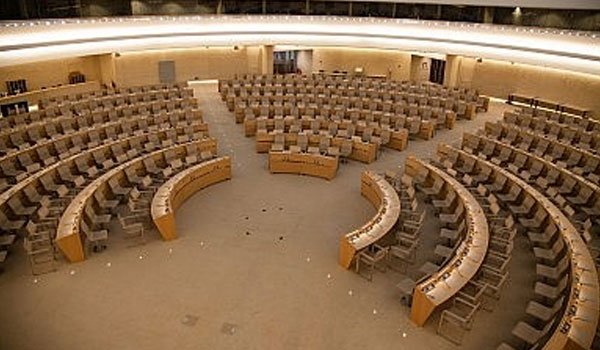The group’s call comes in a statement released yesterday (06).
The signatories to the statement are - Attorney at law Neville Ananda, Attorney at Law Sujeewa Dahanayake, Social activist Muditha Karunamuni, Journalist Kusal Perera, Trade union leader Anton Marcus and Attorney at law Srinath Perera.
The statement says,
The OISL Report presented to the UNHRC Sessions concludes most importantly with the proposal for a "Hybrid" investigation into all war crimes, crimes against humanity and violation of international law that were termed as "horrendous" crimes committed. The GoSL has already rejected a "hybrid" mechanism, proposing its own "Domestic" scheme for investigations. The fourth US Resolution adopted without a division was consented to by the GoSL on the basis it allows for a domestic investigation.
There are many interpretations to it by now. But what is more important to us right now is not how it is labelled, but how such a judicial process could be established to win the trust and confidence of the "victim society". How such a process could win the trust and confidence of a people who had been through a brutal war and keeps demanding for justice for over 06 long years.
We would therefore stress the need to go beyond the approval and statements of the Tamil National Alliance that no doubt makes the government comfortable. With that we wish draw the attention of all stakeholders including that of the GoSL to few relevant and fundamental issues. It is accepted the laws and the legal system in the country is inadequate to conduct the type of impartial and independent investigation the GoSL promises and was agreed upon. The GoSL has stated it would affect necessary legal reforms to have an investigation proper. Our emphasis here is on State agencies that constitute the total judicial process in such a probe.
We don't have in this country now, State agencies that constitute a judicial process that does justice to even ordinary crimes. Like all other State agencies and departments, the Police and the Attorney General's Departments have also degenerated into inefficient, corrupt and bias performers. The fact that there had been no proper investigations into custodial killings, threats, harassment, intimidation caused to victims of police torture who sought redress through FR Petitions and saw the day light murder of Gerald Perera of Wattala goes to prove how indiscipline and corrupt law enforcement is.
Investigations into the most recent case of rape and murder of the 05 year old child prove how inefficient and amateurish the Police department is. Protests, disgust and frustration in society over investigations into alleged crimes committed during the previous government also goes as proof. The 15 year long wait to have the final ruling on the attempted assassination of then President Kumaratunge is no isolated case.
There had been numerous cases where suspects held in detention for long periods have been acquitted thereafter. All such cases and incidents only add to breach of social trust and confidence in the whole judicial process. Though not openly talked about, there is also a racial bias in State agencies that have been through a long process of Sinhalisation.
One reason that doubles it is the fact that these State agencies have extremely low or no minority presence in them. In such context the police in particular have been through very long periods of emergency rule since the 1971 insurrection that now make them to act and behave with extra ordinary powers even under normal law. They have also been an auxiliary force in national security and therefore to have them as one of the State agencies in the investigation process could be disadvantageous to the Tamil people.
These together form the primary reason the Tamil people distrust and discard any investigation carried out by a domestic mechanism. The social distrust and anger in the South over the present degenerated status of the judicial process also adds to what the Tamil society perceives. In this society that is fractured along ethnic and religious lines and made to think and work on ethno religious divisions, it is important we work towards a socio political consensus to carry through an extremely important national investigation of the type that is being proposed. That makes the parliament the forum to reach such consensus.
Yet we wish to stress the fact that agreement in parliament would not create a social consensus in a polarised society. In establishing a domestic mechanism with a mandate for reconciliation too, it is important the whole society accepts that those people in the North and East who had been through a brutal war and for over 06 years had been yearning to have and are demanding justice to their long standing grievances should be given such opportunity for justice. The first thing that should happen for such justice to be possible is to re-establish a judicial process that is well disciplined and can be impartial, independent and efficient.
We are aware of the difficulties in doing that. But despite our serious reservations on the Constitutional Council, it is necessary to stress here and emphasise the inalienable responsibility of the GoSL in immediately constituting "Independent Commissions" with individuals of integrity and competence. That should and could pave the way for a disciplined system. Such effort should also be fortified with social efforts to bring this 06 decade long ethnically and religiously bifurcated country into a single society with a common purpose.
While that is the responsibility of the GoSL first, we also wish to say, that same responsibility lies with all media, all editors and journalists too. Finally we wish to appeal to all academics, the intelligentsia, the professionals, social activists and all artistes and trade unions to shoulder this responsibility of reforming systems that is a necessity for a civilised and decent society.






